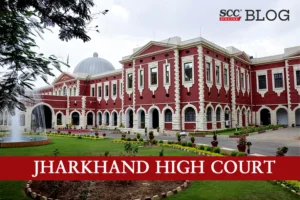Jharkhand High Court: In an appeal by State challenging order passed by the Single Judge Bench on 13-06-2022 holding that Labour Cess was not leviable on supply of materials and consultancy charges for a contract, which were distinct from contracts of civil works, with the argument that the Single Judge Bench could not have entertained the petition under Article 226 of Constitution of India while there was an alternative remedy available under Section 11 of the Building and Other Construction Workers Welfare Cess Act, 1996 (‘Cess Act’) read with Section 14 of the Building and Other Construction Workers Welfare Cess Rules, 1998, the Division Bench of Sanjaya Kumar Mishra, CJ and Ananda Sen, J.* concurred with the Single Judge’s findings regarding existence of two separate contracts and dismissed the instant petition.
Apart from restricting Labour Cess, the Court through the impugned order had also directed the refund of Labour Cess deducted against the petitioner’s bill for supply of material and consultancy charges.
Single Judge’s Decision
The Court highlighted that separate agreements were entered for both contracts: one on 21-02-2019 for supply of materials and the other on the same day for erection and civil works. The Court also looked into the purchase orders and work orders dated 18-01-2017 having different purchase prices for designing, engineering, supply of materials, equipment, erection, testing and commissioning of Grid Sub-Station on turnkey basis.
Court’s Analysis
Having gone through the Single Judge’s findings in the impugned order, the Court was of the view that those findings clearly suggested the existence of two separate contracts for supply and construction respectively. The Court scrutinized Section 3 of Cess Act regarding levy and collection of Cess. It further highlighted the definition of ‘building’ or ‘other construction work’ under Section 2(d) of the Cess Act.
The Court viewed the levy on consultancy or supply to be a clear deviation from provisions of Cess Act and observed that “it is quite clear that in relation to any building, streets or even transmission or distribution of power, the “building or other construction” will mean and convene to any construction, alteration, repairs, maintenance or demolition of or in relation to the said structures. It is quite clear from the conjoint reading of Section 2(d) and Section 3 of the Building and Other Construction Workers (Regulation of Employment and Conditions of Service) Act, 1996, that no Cess can be levied on supply or consultancy component. It can only be levied on construction, alteration, repair, maintenance or demolition work.”
The Court relied on U.P. Power Transmission Corpn. Ltd. v. CG Power & Industrial Solutions Ltd., (2021) 6 SCC 15 having similar facts wherein, it was held that the Act excluded supply contracts from its ambit. Regarding alternative remedy, the Court further cited the same judgment upholding invocation of Article 226 that “relief under Article 226 of the Constitution of India may be granted in a case arising from civil contract. Availability of alternative remedy does not prohibit the High Court from maintaining a writ petition in an appropriate case” and clarified that the Power Transmission Company lacked power/authority/jurisdiction to realize labour cess under Cess Act and that the State acted in excess of powers.
The Court therefore concurred with the findings of Single Judge for being in conformity with the Supreme Court’s judgment covering the issues involved and dismissed the instant appeal.
[State of Jharkhand v. M/s Flowmore Limited, 2023 SCC OnLine Jhar 1197, Order dated 27-07-2023]
Order by: Justice Ananda Sen
Advocates who appeared in this case :
For Appellants: Advocate Manoj Tandon, Advocate Neha Bhardwaj;
For Respondents: Senior Advocate M.S. Mittal, Advocate Salona Mittal, Advocate Mrinal Kanti Roy.


